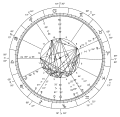This is an old revision of this page, as edited by Zachariel (talk | contribs) at 23:01, 1 July 2012 (Rebuilding content - see hidden note at top which I will delete in next edit and place on talk page. This is the remaining content after a recent merge). The present address (URL) is a permanent link to this revision, which may differ significantly from the current revision.
Revision as of 23:01, 1 July 2012 by Zachariel (talk | contribs) (Rebuilding content - see hidden note at top which I will delete in next edit and place on talk page. This is the remaining content after a recent merge)(diff) ← Previous revision | Latest revision (diff) | Newer revision → (diff)Mundane astrology is the application of astrology to world affairs and world events, taking its name from the Latin word mundus, meaning "the World". It is widely believed by astrological historians to be the most ancient branch of astrology. Astrological practices of divination and planetary interpretation have been used for millennia to answer political questions. It was, however, only with the gradual emergence of horoscopic astrology from the sixth century B.C. that astrology developed into two distinct branches, mundane astrology and natal astrology.
References
- Michael Baigent (1994). From the Omens of Babylon: Astrology and Ancient Mesopotamia. Arkana.
- Michael Baigent, Nicholas Campion and Charles Harvey (1984). Mundane astrology. Thorsons.
- Steven Vanden Broecke (2003). The limits of influence: Pico, Louvain, and the crisis of Renaissance astrology. BRILL. pp. 185–. ISBN 978-90-04-13169-9. Retrieved 5 April 2012.
